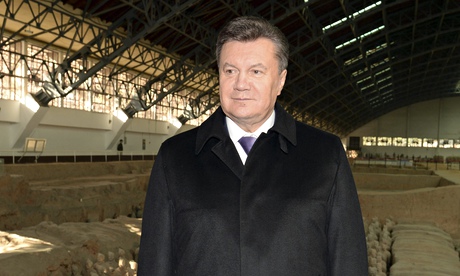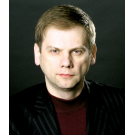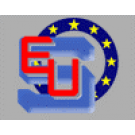 No indication of how long Viktor Yanukovych will be on leave after statement on presidential website
No indication of how long Viktor Yanukovych will be on leave after statement on presidential website
Ukraine's embattled president, Viktor Yanukovych, is taking sick leave as the country's political crisis continues with no sign of resolution.
A statement on the presidential website on Thursday said Yanukovych was on sick leave due to an acute respiratory illness and high fever. There was no indication of how long he might be on leave or whether he would be able to do any work. The chief medical officer said the president was suffering from a "severe cold with a high temperature".
Yanukovych is under pressure after two months of major protests seeking his resignation, early elections and other demands. On Tuesday Yanukovych's hardline prime minister, Mykola Azarov, quit in an apparent concession to the opposition. The president has yet to appoint a successor. Azarov's deputy, Serhiy Arbuzov, has taken over as interim PM.
Yanukovych's illness is another unpredictable element in Ukraine's already combustible political drama. His predecessor, Viktor Yushchenko, fell dramatically ill in 2004 after apparently being poisoned with dioxin, while standing against Russian-backed Yanukovych in the presidential election.
On Wednesday, meanwhile, Ukraine's parliament passed a law that would grant an amnesty to arrested protesters but – to the opposition's fury – depended on the demonstrators vacating all occupied government buildings. Yanukovych turned up in parliament late on Wednesday evening for the vote, looking pale. He is said to have told supporters that he had been receiving treatment in hospital.
After 12 hours of negotiations the amnesty law was passed amid applause from the ruling party and angry shouts of "shame!" from the opposition.
Over 50 members of Yanukovych's Regions party were willing to approve a milder version of the draft law that would have allowed the unconditional release of protesters arrested during clashes. But the president insisted that the amnesty could only take place if occupied administrative offices were freed in the next 15 days, after the new law comes into force. The law passed by 232 votes.
Protesters are holding three administrative buildings in Kiev, including the building housing the city administration. With temperatures in Kiev falling to as low as -20C at night, the buildings are vital for the opposition's ability to continue street protests and maintain pressure on the government.
Yuri Miroshnychenko, Yanukovych's representative in parliament, said the protesters would now have to leave the buildings. But he insisted the opposition headquarters in Trade Union House, as well as Independence Square and Khreschatyk Street, where the protest camp is located, would not be touched.
The offer was quickly greeted with contempt by opposition protesters. Vitali Klitschko, leader of the opposition UDAR party, said the law "will only increase the temperature in society", while Andriy Parubiy of the Batkivshchyna party called the demands unacceptable. "No one will comply with them," he said.
Ukraine's political uprising began more than two months ago as a pro-European movement after Yanukovych rejected an integration pact with the European Union. Instead he accepted a $15bn bailout from Russia. The Kremlin has now said it may fail to pay the loan in full if the government changes. The protests have since spread across much of the country, and have turned into a highly personal campaign to topple Yanukovych. Radical groups clashed with the police last week, with at least three deaths among civilians. Several dozen opposition activists have disappeared. Amid an escalation that turned Hrushevskoho Street in the centre of Kiev into a kind of battlefield, officials even mooted imposing a state of emergency in the country.
Parliament has voted to repeal a series of draconian laws hurriedly passed on 16 January, which outlawed freedom of assembly and ushered in – according to critics – a form of dictatorship. So far, however, Yanukovych has not ratified the vote, which means that the punitive laws still stand.
 Dzobak Volodymyr
РОЗДУМИ ПРО НАДВАЖЛИВЕ або ЧОМУ НАШІ ОЛІГАРХИ СТАЛИ МОГИЛЬЩИКАМИ НИНІШНЬОЇ УКРАЇНИ
Dzobak Volodymyr
РОЗДУМИ ПРО НАДВАЖЛИВЕ або ЧОМУ НАШІ ОЛІГАРХИ СТАЛИ МОГИЛЬЩИКАМИ НИНІШНЬОЇ УКРАЇНИ




 No indication of how long Viktor Yanukovych will be on leave after statement on presidential website
No indication of how long Viktor Yanukovych will be on leave after statement on presidential website